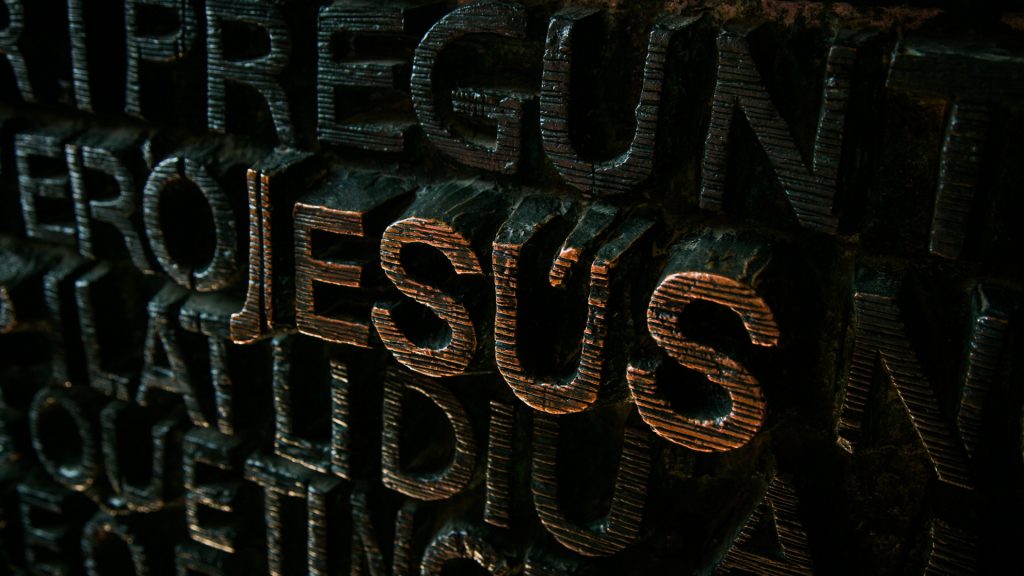The Gospels
Being Rich
Read This Week: Matthew 19
Just then a man came up to Jesus and asked, “Teacher, what good thing must I do to get eternal life?” Jesus replied, “‘You shall not murder, you shall not commit adultery, you shall not steal, you shall not give false testimony, honor your father and mother,’ and ‘love your neighbor as yourself.’” “All these I have kept,” the young man said. “What do I still lack?” Jesus answered, “If you want to be perfect, go, sell your possessions and give to the poor, and you will have treasure in heaven. Then come, follow me.” When the young man heard this, he went away sad, because he had great wealth. – Matthew 19:16-26 NIV
In Matthew 19, we find a pretty famous story of the rich, young ruler. This account is a microcosm of a modern-day struggle. Struggles that we all have with personal pride, self-righteousness, and sufficiency. We do not have to conduct a deep examination of our hearts to see the similarities we share with the young man. Like him, our greatest challenge can be the desire to follow God our way while relying on our accomplishments to enter the kingdom of heaven. Removing this obstruction to true richness is why the Lord said this in verse 21:
“If you want to be perfect, go, sell your possessions and give to the poor, and you will have treasure in heaven. Then come, follow me.”
Jesus was making a statement to the disciples, the crowd, and to us today that the things of this world present the highest barriers to truly following and loving God. But it was not an indictment on wealth or possessions in and of themselves but a reflection of the heart’s posture toward those things. The teaching and true takeaway from this passage is not to place them above a relationship with Christ as the rich, young ruler did. Instead, the treasures in heaven should be valued or invested in with greater love, passion, energy, and pursuit than the treasures on earth. It is the one thing we often lack in life, yet it is the most important.
Our hearts are the issue, not our bank accounts. We are not broke financially as much as we are broke spiritually. Jesus is saying that when we are like the rich, young ruler, we are broken in our allegiance and devotion to the Lord. We are broke on faith and gratitude, broke on trust and healthy risk. We are broke on the stewardship of our resources and blessings. We are broke on confidence in a sovereign God who can take care of us. Our priorities and vision are broken, and therefore, our hearts can be misguided.
However, we do not have to stay broke. We can adopt a kingdom and eternal mindset that puts our hearts and eyes on the transcendent purposes of Christ. We can place our focus, not on the temporal things that will fade away, cause us to be fearful and greedy, and ultimately stand in the way of an intimate relationship with Jesus, but on the pursuit of God and his righteousness that lasts forever.
Of all the people who came to the feet of Jesus, the rich, young ruler was the only person who went away unchanged. That is why he went away sad. He failed to realize the most vital thing was not doing for God his way but being a passionate, pursuing child of God. He missed the greatest joy and fulfillment that we can experience on earth, and that is a vibrant, intimate relationship with Jesus. That is being truly rich. As Jesus said, with man this is impossible, but with God all things are possible.” Because of what Christ did on the cross, we do not have to earn a single penny or own a single thing to be rich.
That Is Great
Read This Week: Matthew 18
At that time, the disciples came to Jesus and asked, “Who, then, is the greatest in the kingdom of heaven?” He called a little child to him and placed the child among them. And he said: “Truly I tell you, unless you change and become like little children, you will never enter the kingdom of heaven. Therefore, whoever takes the lowly position of this child is the greatest in the kingdom of heaven.” – Matthew 18:1-4 NIV
Peter, James, and John had just been on the mountain with Jesus during the Transfiguration. They had seen the glory of God and been through something few human beings had ever encountered. They had an experience that should have infused passion, joy, and harmony into their community, yet the Bible tells us that it led to rank, file, and posturing about who was the greatest among them.
They got pulled into the human hierarchical view of life. This view asserts that the higher you are will translate into the most influence, significance, and greatness. The world’s philosophy is you are great if others are working for you, but the message of Christ is that greatness comes from serving others.
This brings us to Matthew 18. It is packed full of theological and practical teaching that can inform our lives at all levels. Not least of which is Jesus addressing the question of who is the greatest in the kingdom of heaven? The answer to this particular question cuts to the heart of so many issues we face in life. The assertion that lowliness or humility makes a person great underwrites all the principles taught in the passages that succeed it. This statement from Jesus in verse 4 sets the tone for the rest of the chapter:
“Therefore, whoever takes the lowly position of this child is the greatest in the kingdom of heaven.”
Servanthood and humility are the prerequisites for a life that honors God on this earth. To take the position of a servant as Jesus did and be humble as a small child is to navigate all the nuances of the Christian life that expresses the heart of God to the world. These postures can prevent us from stumbling and causing others to be damaged by our choices (v. 6-9). These spiritual heart attitudes can empower us to stay in the pursuit of God and not wander away, but if another person wanders, humility will cause us to pursue them as the Lord pursued us (v. 10-14).
Servanthood to Christ and the humility of a child pave the way for dealing with sin in the church, resolving conflict and disputes in a Goldy manner (v. 15-20). These attributes lead to restorative justice and reconciliation among people who have erred and bring people back together in community. The lowly position tunes our hearts to compassion, forgiveness, and mercy for others lost on the wicked servant in verses 21-35. This idea of true greatness through assuming and aspiring to the lowest place in the kingdom is what the Lord wants.
May we not be concerned with the questions that preoccupied the disciples. May we be so intent on and interested in serving others and doing so from a position of humility that we forget the idea of status altogether. And may the Holy Spirit inspire and empower us to be involved in great things for the glory of God and know that it probably won’t have anything to do with the world’s standards of greatness. But as Jesus instructed, that is what will make it great.
Mountain Experience
Read This Week: Matthew 17
After six days Jesus took with him Peter, James, and John the brother of James, and led them up a high mountain by themselves. There he was transfigured before them. His face shone like the sun, and his clothes became as white as the light. Just then there appeared before them Moses and Elijah, talking with Jesus.
– Matthew 17:1-3 NIV
The Scriptures are filled with mountain experiences. The Ark came to rest on the top of a mountain after The Flood. Abraham’s ultimate test of faith with his Son, Isaac, took place on a mountain. God gave Moses the Ten Commandments on a mountain. Elijah defeated the prophets of Baal on Mount Carmel, and Isaiah assured Israel that Mount Zion would be the site of a feast unlike any in the history of the world. Jesus’ teaching of The Be-Attitudes happened on a mountain; He died for the sin of the world on Golgotha, a mountain outside the city gate, and in Matthew 17, He revealed Himself as the Son of God to Peter, James, and John high up on a mountain. Mountains are significant to how God speaks.
In the previous chapter, Jesus establishes Himself as the One over and among all by the disciples’ confession. He was no ordinary man or even a great prophet or leader like Elijah or Moses, but He was indeed the Son of God. Jesus confirmed the words of Peter and that his declaration was revealed to him by the Lord. Now, he would show that He was the Son of God in a spectacular demonstration of His glory upon a mountain. He takes three disciples with Him, and verses 2-3 tell us of this incredible scene:
There he was transfigured before them. His face shone like the sun, and his clothes became as white as the light. Just then there appeared before them Moses and Elijah, talking with Jesus.
The transfiguration was a statement about Jesus’ authority and power. This revelation demanded that people receive Jesus as transcendent and One who had the divine credibility to speak to them. It revealed that Jesus alone is supreme over all men and that Moses and Elijah were vessels and servants that fulfilled a temporary purpose in God’s ultimate plan. Jesus establishing Himself as the High Priest and prophet caused so much division in the early church, yet God had already instituted this.
The transfiguration also confirmed the glory of God, and that the mission of the gospel and the advancement of the kingdom would reveal that same glory. The three selected disciples saw a preview of this and it encouraged and emboldened them with the truth of Jesus. They could trust His identity and place their faith in His promises, provision, and power just as we can today for the same reason.
This mountaintop experience was not random. It was a precisely timed event within the will of God to show the disciples and us what kind of Messiah Jesus was and is. It demonstrates the greatness of the Lord and helps us tear down our limited and human notions of Jesus and how he relates to us. Our mountain experiences are not random either. God uses them to show us who He is and what our potential is in Him. He meets us there, teaches us, changes our lives, and sends us back into the world with faith, hope, and joy to be on mission with Him.
The One
Read This Week: Matthew 16
When Jesus came to the region of Caesarea Philippi, he asked his disciples, “Who do people say the Son of Man is?” They replied, “Some say John the Baptist; others say Elijah; and still others, Jeremiah or one of the prophets.” “But what about you?” he asked. “Who do you say I am?” Simon Peter answered, “You are the Messiah, the Son of the living God.” Jesus replied, “Blessed are you, Simon son of Jonah, for this was not revealed to you by flesh and blood, but by my Father in heaven. – Matthew 16:13-17 NIV
No one in the history of the world of note has endured mistaken identity and misconception quite like Jesus Christ. This misinterpretation of who He was and what His mission entailed began while He was still on earth, and it persists today. People have a hard time fully understanding the person of Christ – His divinity, His humanity, and His ultimate purpose and glory. Because of this, incorrect assertions, characterizations, and truth claims are made about Jesus in multiple ways. The late author and philosopher, C.S. Lewis summed this up perfectly in his classic book, Mere Christianity:
“I am trying here to prevent anyone saying the really foolish thing that people often say about Christ: ‘I am ready to accept Jesus as a great moral teacher, but I do not accept His claim to be God.’ That is the one thing we must not say. A man who was merely a man and said the sort of things Jesus said would not be a great moral teacher. He would either be a lunatic on a level with the man who says he is a poached egg, or else he would be the Devil. You have to make a choice. Either this man was, and is, the Son of God or else a madman or something worse. You can shut Him up for a fool, you can spit at Him and kill Him, or you can fall at His feet and call Him Lord and God. But let us not come up with any patronizing His being a great human teacher. He has not left that open to us. He did not intend to.”
Jesus himself knew this was prevalent even while He was in the flesh, performing miracles, teaching, and revealing the glory of God. So he decides to stop in the middle of His ministry in Matthew 16 and ask his closest followers about His identity and who they and the world thought He was. In verse 13, he asks about the macro perspective of his identity, and then He makes it personal in verse 15 and asks the disciples themselves. He says, “Who do people say the Son of Man is?” and “Who do you say I am?” It is helpful for us to address the same questions in our lives. Who do people in our day say Jesus is and who do we as His followers say He is in our hearts, with our mouths, and our actions.
We need to be aware and in tune with how our friends, neighbors, co-workers, and culture see and perceive Jesus. This knowledge is important as we seek to love people, minister to them, and address their doubts and skepticism while showing them grace and compassion. We cannot do this to the glory of God if we’re not dialed into their beliefs. This is why the Lord asked His followers who people said He was. He wanted them to know the intellectual, spiritual, and cultural barriers that stood between them and knowing Jesus.
He then turns to the disciples for the most important question: Who do you say I am? The same question that is still most vital to us, and one that we must know with the same confidence and faith as Peter in verse 16: You are the Messiah, the Son of the living God. We must know this Christ and his attributes, supremacy, and the reality of His current and future glory. Knowing Jesus informs our beliefs, galvanizes our worldview, strengthens our faith, and gives us hope and joy. It also empowers us to witness to others the true identity of Christ and present the truth of His salvation and gospel.
Jesus is as Peter expressed. He is The One. He was not just a good teacher, a wise sage, a prophet like Jeremiah, or a religious icon. He was not a cosmic genie or just God’s nice son that interceded for His judgmental father. He wasn’t a liar or lunatic in the tradition of cult leaders or a martyr to incite a revolution. He was and is who Peter said he was. He is Lord. He was in the beginning with God, and He was God, and He still is. He is The One for all time, and He reigns above all other opinions about Him. May we live this truth out in front of a skeptical world and proclaim it in faith so that all may know and experience life with Him.
Satisfied
Read This Week: Matthew 15
He told the crowd to sit down on the ground. Then he took the seven loaves and the fish, and when he had given thanks, he broke them and gave them to the disciples, and they in turn to the people. They all ate and were satisfied. Afterward, the disciples picked up seven basketfuls of broken pieces that were leftover. The number of those who ate was four thousand men, besides women and children. – Matthew 15:35-38 NIV
Matthew 15 contains one of the most famous and widely read stories of Jesus’ ministry and life on earth – the account and miracle of Him feeding the masses of over four thousand people with just seven loaves and a few small fish. It is a transcendent and practical illustration of how God cares for our needs and is an example of how He tends to the little things in our lives and moves to meet our foundational provisions in spectacular ways. This story also shows us the power of God and His love for people and their well-being.
If we read this passage in its context, the feeding of the four thousand is not a surprise. Jesus was continuing his ministry and performing divine miracles throughout the chapter. He already healed the demon-possessed daughter of a Canaanite woman, and as he traveled, verse 30 tells us that great crowds came to him, bringing the lame, the blind, the crippled, the mute, and many others, and laid them at his feet; and he healed them. God’s power was on full display already in this section of Scripture, so what He does in feeding the crowds comes as no shock in light of His divine might through the person of Jesus.
Yet, the disciples still struggle with their faith in God’s ability to do unexplainable things among them. After Jesus says he doesn’t want to send the crowd away hungry, the disciples are skeptical of how they will feed everyone despite witnessing all of His previous miracles. They say back to him in verse 33, where could we get enough bread in this remote place to feed such a crowd?
It is difficult to be hard on the disciples here because we have the same tendencies in our lives. We watch as God meets our needs and performs miracles on a grand stage, yet we still struggle to have faith and believe that He will provide for us day-to-day. But if he can heal the sick and make the blind see and make a disabled person walk, surely He can make sure we have enough food to eat.
Jesus shows them and us once again of His capacity. Verses 36-37 say:
Then he took the seven loaves and the fish, and when he had given thanks, he broke them and gave them to the disciples, and they in turn to the people. They all ate and were satisfied.
Not only did Jesus assess the situation, consider the need, and provide the food, the Bible tells us that the people had enough and were satisfied. Isn’t that just like God? He loves us so much that He cares for the small details of our lives, and He knows what we need at all times. But, He responds in His grace and mercy to our situations in such a way that not only does He give His provision, but we are also satisfied. In our life with God, when He provides, we don’t need anything else. He is our ultimate satisfaction.
Winds of Faith
Read This Week: Matthew 14
“Lord, if it’s you,” Peter replied, “tell me to come to you on the water.” “Come,” he said. Then Peter got down out of the boat, walked on the water, and came toward Jesus. But when he saw the wind, he was afraid and, beginning to sink, cried out, “Lord, save me!” Immediately Jesus reached out his hand and caught him. “You of little faith,” he said, “why did you doubt?” And when they climbed into the boat, the wind died down. Then those who were in the boat worshiped him, saying, “Truly you are the Son of God.” – Matthew 14:28-33 NIV
Matthew 14 shows us a pivotal moment where Peter and the disciples face some questions about their faith. They were in a boat without Jesus, and the wind picks up on the lake and begins to stir the waves. Jesus then walks out to the disciples on the water, and it terrifies them as they think they’re looking at a ghost. But the Lord assures them of his presence by identifying Himself, yet this does not calm their fear.
Peter then asks Jesus to perform an additional miracle to prove his identity. He says in verse 28: “Lord, if it’s you,” Peter replied, “tell me to come to you on the water.” Peter was asking God to prove he is God. He wanted him to identify himself as the Almighty by doing another miracle outside of walking on water. He called out to Jesus to confirm his identity by causing him to do something he could not do if the Lord were not there.
We tend to do the same things. We seem to want God to do something tangible or miraculous in our lives to prove Himself to us, but He often wants to do something miraculous in us that builds our faith. We want the miracles of life and it causes us to take our eyes off the One who provides them. Verse 30 illustrates this:
Then Peter got down out of the boat, walked on the water, and came toward Jesus. But when he saw the wind, he was afraid and, beginning to sink, cried out, “Lord, save me!” Immediately Jesus reached out his hand and caught him. “You of little faith,” he said, “why did you doubt?”
Like Peter and the disciples, God allows us to go through moments and seasons that are not solved by things we can see but by increasing our faith in the unseen. Sometimes we need to grow in our faith in the middle of the storm and not doubt God’s provision for our lives.
We need the winds of faith, not the winds of convenience or comfort. The winds of faith are unique because they come in the middle of the struggle, in the middle of hurt, fatigue, and exhaustion. Unlike instant gratification, the winds of faith give us the strength to press on and the resilience to face the next challenge.
We are resilient and powerful through faith in Jesus. There is so much strength within us through the power of the Holy Spirit. And when we trust Him and are propelled by the winds of faith and not doubt, our lives are energized and empowered to release the potential inside to stand up, walk on the troubled waters of life, and be successful. The winds of faith can take us further than we ever thought we could go and help us realize that God is exactly who He said He was all along.
Moral of the Story
Read This Week: Matthew 13
That same day Jesus went out of the house and sat by the lake. Such large crowds gathered around him that he got into a boat and sat in it while all the people stood on the shore. Then he told them many things in parables. – Matthew 13:1-3 NIV
Stories are the sound bites of life; they possess abilities. They can be humble yet boastful. They can attract or repel. They can build up and tear down. They can bring peace, preserve history, communicate truth, reunite friends, and harmonize families. They can sink ships, save lives, and close deals.
A good story. Every person, young or old, wants one. We want to hear one. We want to tell one to impress a stranger or entertain a large crowd. We want to read one in the pages of a novel or in a show we watch on Netflix. We want to watch one in a movie or acted out on a stage. We want to live a good story, a story that can get a reaction, incite laughter, and move one to tears. A story that motivates action and inspires life. No matter where we come from or where we’re going, we all love a good story.
Jesus understood this about us better than anyone. He knew how to communicate and harness the power of a story. He taught life-changing truths through stories to his followers and anyone who listened to Him. In the Gospels, these stories are called parables, or stories illustrating a moral or spiritual lesson. Jesus was creative with his methods, and He made efforts to get down on the level of the people and relate to them. We see this play out in verses 2-3 of Matthew 13:
He sat in a boat while all the people stood on the shore. Then he told them many things in parables.
In this passage, Jesus teaches principles and truth from the seat of a boat using the context of five parables. He communicates to them through the parable of the sower, the parable of the weeds, the parable of the mustard seed, the parable of the yeast, and the parable of the net. Each one carried its message about the Kingdom of God, the gospel, and the responsibility of people. Here are the morals of the stories or the main takeaways from each parable in this chapter:
• Parable of the Sower – We are to be messengers of God and plant His seeds of truth wherever we go. We do not control the condition of the hearts that it falls. But we are to be obedient to share and make sure our hearts are receptive to the word of God. We can choose to respond when hard times come and not fall away from the truth and the gospel. When life gets difficult, we can choose to serve the Lord and His kingdom.
• Parable of the Weeds – Weeds can never produce fruit. But when it comes to the gospel and following Jesus, people can change. What was once a weed can begin to bear fruit in the power of the Holy Spirit. It depends on a person’s choice, and God gives us time to choose. We should receive and respond to the word and not be useless weeds among God’s people.
• Parable of the Mustard Seed – Jesus describes the kingdom as the smallest seed. He is communicating that it begins small and does not come with fanfare and celebrity and human notoriety. Even though this is not what people want, the gospel story is about faithful, gradual growth.
• Parable of the Yeast – Yeast is not very noticeable at first in bread dough, but a small amount produces a big result. The movement of God begins small and inconspicuous, but it grows large. Jesus says that we must start and continue to be faithful in small ways for the kingdom and the gospel. But the entire story of God will grow into something beyond what we can think or imagine if we are faithful.
• Parable of the Net – The gospel captivates both good and bad people. The message comes to both. They exist in a community together and have the opportunity to change and grow. But the time comes when the good separate from the bad. God loves the bad and pursues the bad, yet he wants them to repent and change. We must choose to walk with God and be in the right relationship with Him and in service to His kingdom.
May we all glean and grow from the teachings of Jesus and be receptive to His truth even if it is inconvenient or uncomfortable. May we all ask Him for wisdom to understand the moral of the story and what He wants us to know and apply in our lives. May we all communicate Jesus and the gospel through our stories to everyone who comes into our lives.
The Greatest Servant
Read This Week: Matthew 12
Here is my servant whom I have chosen, the one I love, in whom I delight; I will put my Holy Spirit on him, and he will proclaim justice to the nations. He will not quarrel or cry out; no one will hear his voice in the streets. A bruised reed he will not break, and a smoldering wick he will not snuff out till he has brought justice through to victory. In his name, the nations will put their hope. – Matthew 12:18-21 NIV
So much has been written and said about the idea and application of being a servant. We are to be servant leaders at work, serve our spouse and kids, serve the community, and serve faithfully in our church. But where do we go for an example to follow? We have to look no further than Jesus himself, the greatest servant of all time and the one who was able to fulfill the prophecies about his servanthood.
In this passage, we see that God required perfect service from us, but we could not live up to this standard. So Jesus stepped in and took upon himself the nature of man and performed the will of God. Through his life, death, burial, and resurrection, He communicates grace to us as a servant and enables us to love and serve in a manner worthy of Him. Jesus showed us how to be a servant from the highest place of honor.
This same servant, Jesus, shows us that we can lead others without being contentious, complaining, gossiping, or having an ulterior motive. He shows us that we do not need to be loud and braggadocious and seek attention for ourselves. He shows us that we can be bold and speak His word while maintaining our integrity and allowing the truth to take effect. He shows us that we can be strong in the face of adversity and challenge from those who seek trouble, and that discretion is not a sign of weakness but wisdom.
This same servant, Jesus, who humbled himself to the point of death on a cross to bring glory to God and redeem man, is the same Jesus who is all that we need. This same Jesus who didn’t sin but became sin for us so that we might be made right with God through him is the same one who has the authority, grace, and compassion to love us despite our past, our failures, and who we think we are.
This same servant, Jesus, who walked through undeserved, heinous torture, and died with two thieves without protest, is the same one who has the power to heal us, make us whole, and comfort us when we are hurting. This same Jesus who was betrayed by a friend, falsely accused of a crime, illegally put on trial, and forsaken by his people, is the same one who can bring meaning and hope to our lives when they don’t make sense.
This same servant, Jesus, who was at the beginning with God and victoriously raised, is the same one who has the ability, authority, and capacity to save us from an unthinkable, eternal destiny apart from Him. Verse 21 says, in his name, the nations will put their hope. It is in the greatest servant of all time that we find ultimate hope and peace. He alone is worthy of that title and worthy of our emulation in every area of our lives.
Refresh
Read This Week: Matthew 11
At that time Jesus said, “I praise you, Father, Lord of heaven and earth, because you have hidden these things from the wise and learned, and revealed them to little children. Yes, Father, for this is what you were pleased to do. “All things have been committed to me by my Father. No one knows the Son except the Father, and no one knows the Father except the Son and those to whom the Son chooses to reveal him. “Come to me, all you who are weary and burdened, and I will give you rest. Take my yoke upon you and learn from me, for I am gentle and humble in heart, and you will find rest for your souls. For my yoke is easy and my burden is light.”
– Matthew 11:25-30 NIV
No word picture in the New Testament or the Gospels shows the depth of what we have in our life with God more than the teachings of Jesus in verse 27 where he says:
All things have been committed to me by my Father. No one knows the Son except the Father, and no one knows the Father except the Son and those to whom the Son chooses to reveal him.
We have received all that God has for us by coming to know Jesus. By entering into a relationship with the One who called us to himself. Our lives can be Godly lives that refresh, renew, and are sustainable in normal circumstances; in difficult situations; in relationships; sitting in traffic; working out; or parenting kids.
This passage shows how our faith refreshes us when life is overwhelming. But it also provides insight into how our difficult moments can be an opportunity to advance in our walk with Christ. We lack nothing because the Father has revealed Himself in the Son. Jesus is more than enough for us.
Without this connection, we can do nothing that glorifies God, but with this relationship, even the downtimes are sacred and impactful, and the small decisions benefit from renewal. We are all in need of encouragement, direction, and strength in the minor and the major. Sometimes, just getting through the day requires spiritual refreshment. God can refresh and sustain us if we rely on and trust in Him. Jesus tells us that if we take His burden upon ourselves and learn from Him, we will find rest for our souls.
In this rest, the Holy Spirit can arrange an encounter between selfishness and sanctification. When we tap into everything that God has given us in Jesus, we begin to tear down the false image and rebuild a new, refreshed person alive in the fullness of Christ. Our attitudes shift from personal gain to spiritual renewal. We go from looking for relief from our stuff to passionately seeking the will of God just like the message Jesus relayed to John the Baptist. He wants us to stop focusing on our present circumstances and place our sight on and trust in Him and His perfect will no matter what comes our way in life.
Spiritual and emotional healing and refreshment take place when we move toward and go to God. Jesus says in verse 28, Come to me. He is telling us that He will help us deal with our issues and challenges along the path of pursuing him. This promise made to those listening to the words of Jesus centuries ago certainly rings true for us in the present. He will refresh us and strengthen our hearts and minds as we engage with his truth every day. His yoke is easy, and His burden is light. This truth is a refreshing promise whenever and wherever we find ourselves in life.
Sent
Read This Week: Matthew 10
“Whoever does not take up their cross and follow me is not worthy of me. Whoever finds their life will lose it, and whoever loses their life for my sake will find it. Anyone who welcomes you welcomes me, and anyone who welcomes me welcomes the one who sent me.” – Matthew 10:38-40 NIV
Chapter 10 is a critical place in “The Gospels” series as we continue to read and learn from the book of Matthew. Here, Jesus gathers his disciples around him and gives them spiritual authority to go and do apostolic things like drive out evil spirits, raise the dead, and heal sickness and disease. This moment and sending out of the disciples is important because, for the first time, Christ is endowing his spiritual power and authority to others to go and do His ministry in the world.
It is also necessary to be aware of who is being sent out by Jesus. Sometimes, there is confusion around who the 12 disciples actually were, and Matthew has done a great service by providing a listing of the names in verses 2-4 of this passage:
Simon (who is called Peter) and his brother Andrew; James son of Zebedee, and his brother John; Philip and Bartholomew; Thomas and Matthew the tax collector; James son of Alphaeus, and Thaddaeus; Simon the Zealot and Judas Iscariot, who betrayed him.
Once he identifies who is being sent out, Matthew lays out exactly what Jesus wanted them to do in their ministries to the people. The striking thing here is that it is comprehensive, precise, and detailed. Jesus is specific and thorough in the way He instructs them to conduct their service and ministry. Much like God’s Word does for us today, Jesus doesn’t leave them to do it on their own. He doesn’t tell them to go and figure it out later. He gives them a game plan to follow and a pathway to success and effective ministry in His spirit.
This is our experience as well. The Bible tells us how to live the Christian life. God did not leave us without guidance, wisdom, and a plan. The following is a capsule of what Jesus tells them in verses 5-28:
• Only go to the Jewish people
• Proclaim the kingdom of heaven
• Heal the sick
• Raise the dead
• Cleanse those with diseases
• Drive out demons
• Don’t take any money
• Don’t take a bag of extra clothes
• Stay in people’s houses
• Try not to waste time on those who won’t listen
• Be gentle but street smart
• Stand firm in the face of persecution
• Be teachable
• Proclaim the truth with boldness
Then Jesus utters the famous words of sacrifice and the reward of a life with God. He says in verses 38-39, “Whoever does not take up their cross and follow me is not worthy of me. Whoever finds their life will lose it, and whoever loses their life for my sake will find it.” Being a follower of Jesus means being sent out into the world to shine His light. Being sent is not seasonal and does not have a term limit. It is a whole life commitment for all of life. Being sent for life is about sacrifice, not self-fulfillment. Being sent for life means always counting the cost and then taking action in God’s power.
Jesus closes by saying, “If anyone gives even a cup of cold water to one of these little ones who is my disciple, truly I tell you, that person will certainly not lose their reward.” A sent life realizes that the best life comes later. We serve Jesus because we love Him, want to follow Him, and do His perfect will on earth. That is what called and sent people do with their whole life for all of their life.









